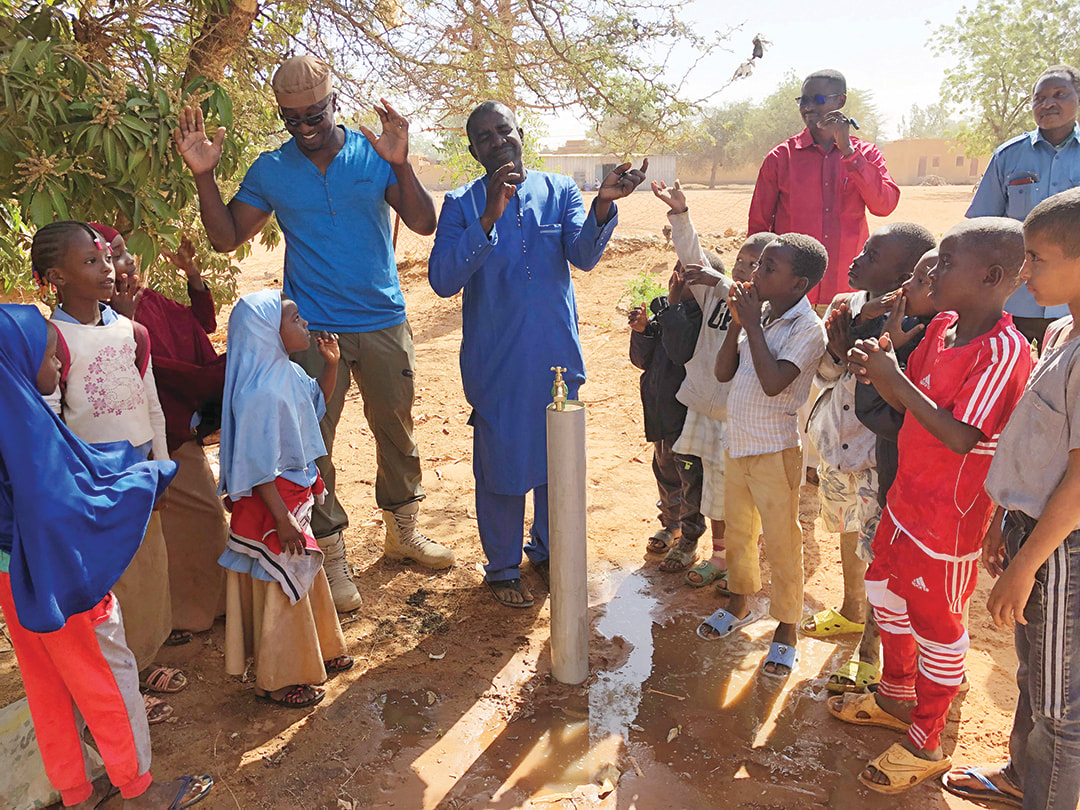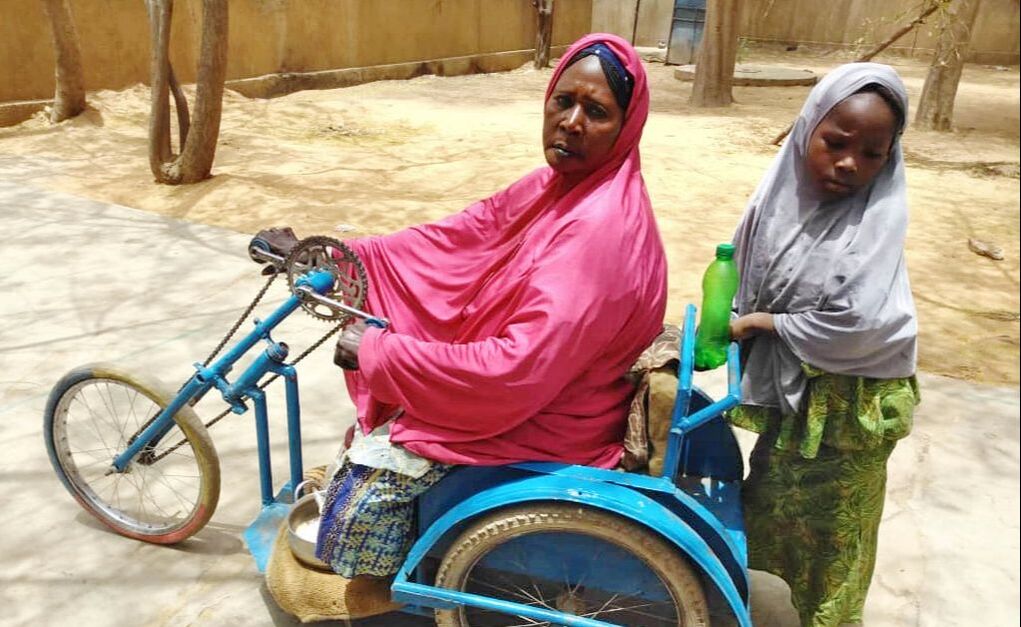Children with disabilities
Children in Niger with disabilities are recognized as one of the groups least likely to be enrolled in school, with 5% or less completing primary school.
The Remember Niger Coalition is committed to supporting all Nigeriens in accessing quality educational opportunities, particularly those who are underrepresented in education and have the fewest opportunities in Niger, including children with disabilities.
Niamey School for the Deaf
In 2020, the Remember Niger Coalition is supporting the construction of a four classroom building at the Niamey Middle School for the Deaf, to ensure that the deaf and hearing-impaired children in Niamey, Niger gain access to the specialized educational facilities and learning resources they need. Construction began in April and is scheduled to be complete in September.
The new building will have 4 separate classrooms and also include the school’s Resource Centre. Classrooms will be equipped with desks and chairs, a large chalkboard at the front of the room and a teacher’s desk. One of the classrooms will house the Resource Centre in the back of the room until the expansion of the second story in the near future.
The new building will have 4 separate classrooms and also include the school’s Resource Centre. Classrooms will be equipped with desks and chairs, a large chalkboard at the front of the room and a teacher’s desk. One of the classrooms will house the Resource Centre in the back of the room until the expansion of the second story in the near future.
Our History and Partnership with the Niamey School for the Deaf
Since 2015, Remember Niger Coalition (Remember Niger) has partnered with the Niamey School for the Deaf (NSD). NSD was established in 1982 by the Niamey Association for the Deaf and serves over 160 deaf students annually in 1st - 6th grades. Because of resource and space constraints, the school has not been able to offer middle school level education to students. Students that complete the elementary level education at the Niamey School for the Deaf are eligible to move on to middle school in mainstream public schools. Since 2007, 62 students have left the Niamey School for the Deaf and attended mainstream public school. Out of these students, only 5 completed middle school and went on to high school. The low rate of matriculation is primarily due to the lack of resources in public schools and negative societal beliefs related to educating students with learning differences. Hearing impaired and deaf students in mainstream public schools do not receive the specialized learning support they need to succeed. By expanding the opportunity to continue learning in a supportive and specialized learning environment, Remember Niger believes that the number of hearing impaired and deaf students completing middle school level education will grow exponentially.
In 2018, our priority for the Niamey School was to create a sustainable source of water for students and staff. We installed a solar-powered pump in the existing well and constructed a water tower, which enables them to expand the garden and increase yields of produce. The school garden also serves as a hands-on educational tool teaching valuable gardening skills that can benefit students both in school and at home.
Since 2015, Remember Niger Coalition (Remember Niger) has partnered with the Niamey School for the Deaf (NSD). NSD was established in 1982 by the Niamey Association for the Deaf and serves over 160 deaf students annually in 1st - 6th grades. Because of resource and space constraints, the school has not been able to offer middle school level education to students. Students that complete the elementary level education at the Niamey School for the Deaf are eligible to move on to middle school in mainstream public schools. Since 2007, 62 students have left the Niamey School for the Deaf and attended mainstream public school. Out of these students, only 5 completed middle school and went on to high school. The low rate of matriculation is primarily due to the lack of resources in public schools and negative societal beliefs related to educating students with learning differences. Hearing impaired and deaf students in mainstream public schools do not receive the specialized learning support they need to succeed. By expanding the opportunity to continue learning in a supportive and specialized learning environment, Remember Niger believes that the number of hearing impaired and deaf students completing middle school level education will grow exponentially.
In 2018, our priority for the Niamey School was to create a sustainable source of water for students and staff. We installed a solar-powered pump in the existing well and constructed a water tower, which enables them to expand the garden and increase yields of produce. The school garden also serves as a hands-on educational tool teaching valuable gardening skills that can benefit students both in school and at home.
School of Hope
The Remember Niger Coalition and the Maradi Center for People with Disabilities partnered together to create the School of Hope for Children with Disabilities. The Maradi Center for People with Disabilities is a dynamic resource and vocational training center for people with disabilities in the Maradi region of Niger. The Maradi Handicap Association and the Hosanna Institute work together to provide people with disabilities the opportunity to receive vocational training. Additionally, the Center provides a specialized tutoring program for children with disabilities, as well as providing tutoring to children whose parents have disabilities. Remember Niger has found that often, it is the children who become constant “helpers” or “guides” for family members with disabilities and, therefore, are excluded from the formal education system themselves. For the past three years, we have provided school supplies to the Maradi Center, and in 2019, at the Center’s request, we worked with them to build a school community specifically for children with disabilities and children whose parents or families have disabilities. By building a school, many children who have been excluded from education are now able to attend school while their parents are participating in Maradi Center programs.
The three-classroom building was completed in November 2019 with one class ready for use in October when the school year began with 20 kindergarten students. This is the first phase in establishing a primary through high school complex for all children, including students with learning differences and unique needs. When complete, the school will serve over 600 students.
The design of the School of Hope classrooms takes into consideration issues of accessibility and barrier-free spaces, including handrails, wide doorways, and access ramps. Construction included the installation of four accessible latrines and hand-washing stations, customized to meet the special needs of the disabled community.
The three-classroom building was completed in November 2019 with one class ready for use in October when the school year began with 20 kindergarten students. This is the first phase in establishing a primary through high school complex for all children, including students with learning differences and unique needs. When complete, the school will serve over 600 students.
The design of the School of Hope classrooms takes into consideration issues of accessibility and barrier-free spaces, including handrails, wide doorways, and access ramps. Construction included the installation of four accessible latrines and hand-washing stations, customized to meet the special needs of the disabled community.



